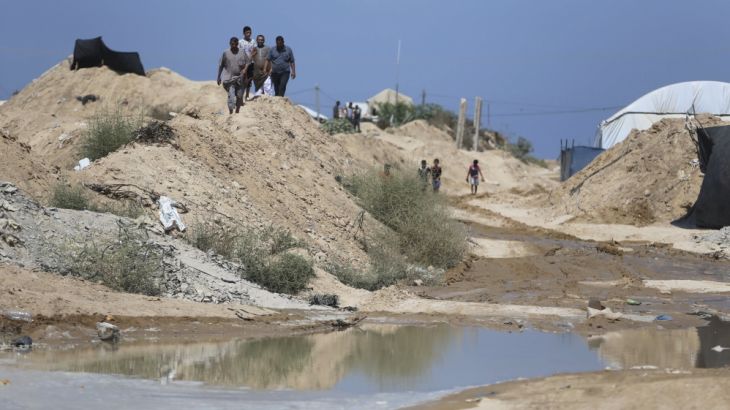Strangled: Gaza after Egypt floods tunnels
Underground lifelines used by residents of the town of Rafah are being flooded by Egypt, worsening existing isolation.

Seventy-three year old Mansura Abu Shaar was more than happy to talk to strangers.
People rarely came this far, she told us, and it seemed to her that very few of those that did, cared enough to ask how they were doing.
Keep reading
list of 4 itemsGeorgia’s president vetoes controversial ‘foreign agents’ bill
‘Regime machinery operating efficiently’ as Tunisia cracks down on dissent
Why Egypt backed South Africa’s genocide case against Israel in the ICJ
“Not well at all,” she said needing little prodding. “Not well at all.”
Mansura was clearly exhausted from having stayed up the night before.
Fearful for her family, she sat outside her makeshift house just a few hundred metres from the border between Gaza and Egypt, on guard until dawn.
“We’re used to the guns and the rockets and the explosions,” she said. “But now – water?”
|
|
Her voice trembled, and tears began to pool in her eyes.
“This is our life,” she said hopelessly.
“We are so, so tired.”
Mansura lives in Rafah, the town divided between Gaza and Egypt by international political agreements in the 1980s.
With Israel the only other way in or out, Gazans saw the border with fellow-Arab Egypt as the “friendly” alternative.
It was a pressure valve when all else around them seemed to be closing in.
But the “friendly border” closed when Hamas took control of the government in Gaza in 2007.
At least in theory.
Underground, an entire network of smuggling tunnels was fully operational.
As it had been for years, allegedly with Egyptian border guards looking the other way.
Millions in taxes
Hamas earned millions of dollars in tax revenues from these smuggling operations.
But aside from seemingly harmless goods, the tunnels were also used as passages for weapons and fighters.
Hamas denied such “transits” but with the changing political tides in Egypt, the denials meant nothing.
And such passages became an even bigger concern than they might have previously been.
![Works being done on the Egyptian coastline of the Mediterranean Sea, viewed from the Gaza side [EPA]](/wp-content/uploads/2015/09/b23d8ad4a7dc429ba3dbc82267e22971_18.jpeg)
So the Egyptians tried to build a wall, and also destroyed built-up areas to create a buffer zone.
The Gazans only dug deeper, and farther.
People here say there are so many tunnels – some going as deep as 30 metres – that these have likely already destabilised the ground.
But many feel they were left little other choice than to dig a way out.
“These tunnels were harmful for both us and the Egyptians,” Subhi Radwan, Rafah’s mayor, said.
“We wanted the relationship between us to be normal, above-ground exchanges.”
‘Betrayed by brothers’
Now, Radwan says, they just feel “betrayed by brothers”.
The Egyptians say they are building fish farms along the border and sea water is flooding the tunnels.
“This will damage the aquifer,” Radwan explained.
“Rafah’s underground water. Which means no potable water. It will also deprive the farmers from using the water for irrigation and growing their plants.

“It will cause landslides, and could lead to the collapse of houses along the borders. Foundations here are already weak from all the shelling…”
There are those that say these scenarios are exaggerated.
But not much can pacify Mansura Abu Shaar.
“There is nothing stable about our lives…” she said.
“Our days are full of horror and fear.”
Her face crumpled in pain, making tangible her deepening sense of isolation and abandonment.
Mansura looked around her warily, her frightened, weary, eyes expecting only the worst.
“We are surrounded by people,” she said passionately, “all looking in, but none of them will help. It is like we are in a desert, forgotten and alone, surrounded, but ignored.”
She clasped her hands to her chest as if struggling to breathe.
![Palestinian children played in water after Egyptian forces flooded the tunnels dug beneath the Gaza-Egypt border [Reuters]](/wp-content/uploads/2015/09/8e4aba1f4d104e728179524c25b2c985_18.jpeg)